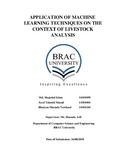| dc.contributor.advisor | Arif, Hossain | |
| dc.contributor.author | Islam, Md. Shajedul | |
| dc.contributor.author | Masud, Syed Tahmid | |
| dc.contributor.author | Tawheed, Bhuiyan Mustafa | |
| dc.date.accessioned | 2018-12-03T04:19:38Z | |
| dc.date.available | 2018-12-03T04:19:38Z | |
| dc.date.copyright | 2018 | |
| dc.date.issued | 2018-08 | |
| dc.identifier.other | ID 14101058 | |
| dc.identifier.other | ID 14301004 | |
| dc.identifier.other | ID 14101244 | |
| dc.identifier.uri | http://hdl.handle.net/10361/10937 | |
| dc.description | This thesis is submitted in partial fulfilment of the requirements for the degree of Bachelor of Science in Computer Science and Engineering, 2018. | en_US |
| dc.description | Cataloged from PDF version of thesis. | |
| dc.description | Includes bibliographical references (pages 49-51). | |
| dc.description.abstract | Livestock industry has been one of the fastest growing sectors of business and research in Bangladesh over the past decade. This rising, lucrative and profitable industry seems to be attracting a good number of enthusiastic investors to invest their capital, and make a contribution to the country’s overall GDP, and recover the deficit in meat production. However, due to lack of suitable resources, reliable data and information, proper knowledge and precise guidance, these investors are lagging behind in generating their expected outcomes. Moreover, these investors and farmers tend to make choices based on their experience only. To come to their assistance in making compatible decisions and provide with a profitable and efficient approach in the investor’s business expansion in Bangladesh, this research aims to establish an intelligent prediction methodology through regression analysis, by implementing data mining and supervised machine learning techniques. This research provides some cattle’s breed based analysis depending on different related factors, which includes age, current weight of cattle, the environment it is reared on, the diet plan and the geographical region it originated from. The models implemented in this research were, Linear Regression model, Ordinary Least Square Regression model, Polynomial Regression model and Decision Tree learning for attaining this prediction mechanism. For executing the analysis, an unanalyzed data set, having a period of 12 years, were collected from Bangladesh Livestock Research Institute, Savar Dairy Farm, and Meghdubi Agro farm. | en_US |
| dc.description.statementofresponsibility | Md. Shajedul Islam | |
| dc.description.statementofresponsibility | Syed Tahmid Masud | |
| dc.description.statementofresponsibility | Bhuiyan Mustafa Tawheed | |
| dc.format.extent | 51 pages | |
| dc.format.extent | 51 pages | |
| dc.language.iso | en | en_US |
| dc.publisher | BRAC University | en_US |
| dc.rights | BRAC University theses are protected by copyright. They may be viewed from this source for any purpose, but reproduction or distribution in any format is prohibited without written permission. | |
| dc.subject | Machine learning | en_US |
| dc.subject | Livestock analysis | en_US |
| dc.subject | Regression Models | en_US |
| dc.subject | Decision trees | en_US |
| dc.subject | Bangladesh Livestock Research Institute | en_US |
| dc.subject.lcsh | Machine learning. | |
| dc.subject.lcsh | Data Mining | |
| dc.title | Application of machine learning techniques on the context of livestock analysis | en_US |
| dc.type | Thesis | en_US |
| dc.contributor.department | Department of Computer Science and Engineering, BRAC University | |
| dc.description.degree | B. Computer Science and Engineering | |

